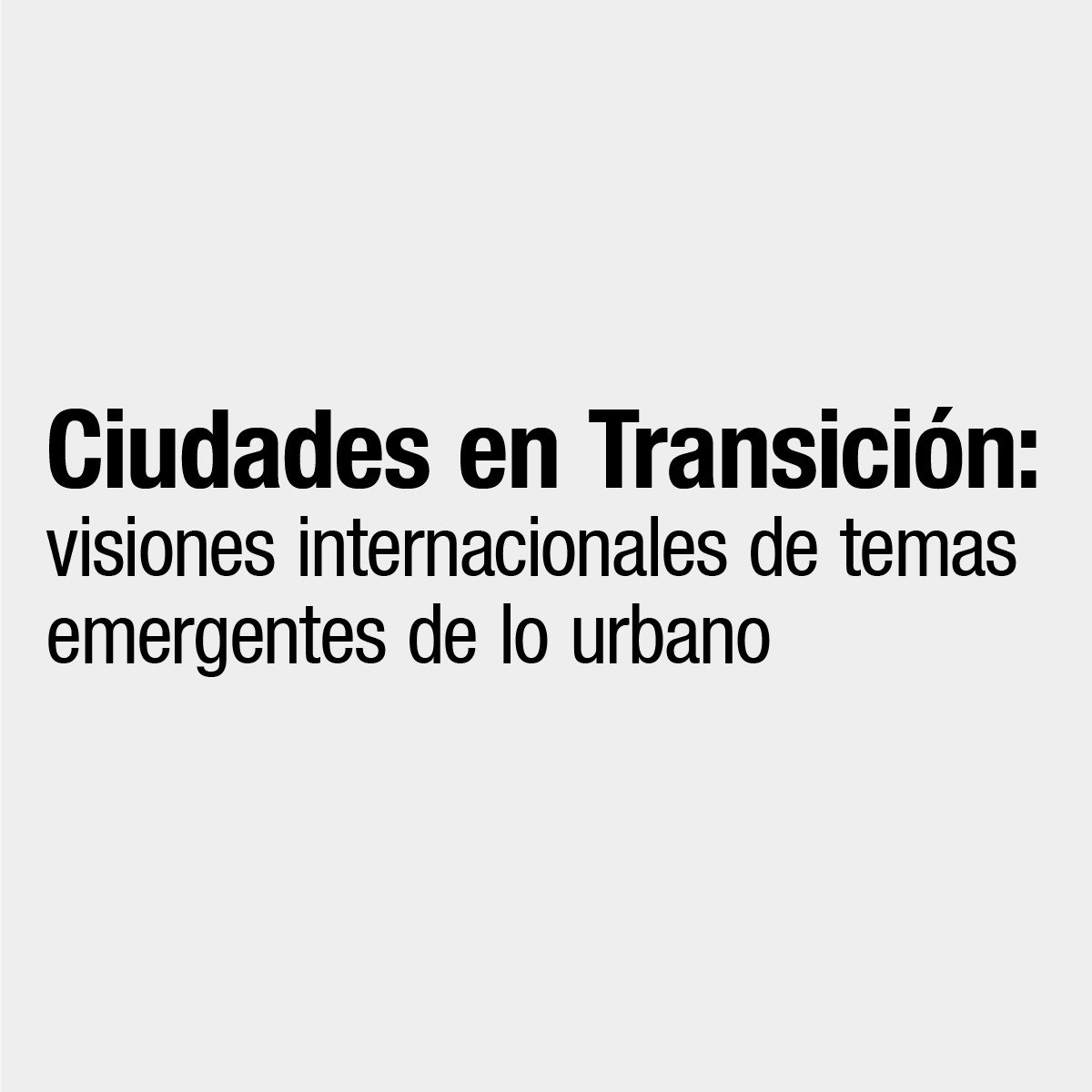
Bienvenidas y bienvenidos al curso Ciudades en Transición: visiones internacionales de temas de lo urbano. En los 4 módulos analizaremos los procesos emergentes en las ciudades desde un panorama internacional e intercultural.
El objetivo de este curso es mejorar la comprensión de los procesos emergentes que experimentan las ciudades desde un panorama internacional e intercultural.
De manera específica, los estudiantes serán capaces de:
Read more
Bienvenidas y bienvenidos al curso Ciudades en Transición: visiones internacionales de temas de lo urbano. En los 4 módulos analizaremos los procesos emergentes en las ciudades desde un panorama internacional e intercultural.
El objetivo de este curso es mejorar la comprensión de los procesos emergentes que experimentan las ciudades desde un panorama internacional e intercultural.
De manera específica, los estudiantes serán capaces de:
Bienvenidas y bienvenidos al curso Ciudades en Transición: visiones internacionales de temas de lo urbano. En los 4 módulos analizaremos los procesos emergentes en las ciudades desde un panorama internacional e intercultural.
El objetivo de este curso es mejorar la comprensión de los procesos emergentes que experimentan las ciudades desde un panorama internacional e intercultural.
De manera específica, los estudiantes serán capaces de:
1. Identificar y comprender los principales conceptos, desafíos y escenarios de temas emergentes de las ciudades desde la visión de la transición socio-ecológica e internacional
2. Construir una postura crítica de las tendencias socio-ecológicas del urbanismo contemporáneo
3. Construir una visión comparativa internacional de las innovaciones socio-tecnológicas de un grupo de ciudades
What's inside
Syllabus
Módulo 1
Bienvenidas y bienvenidos al curso Ciudades en Transición: visiones internacionales de temas de lo urbano. En los 4 módulos analizaremos los procesos emergentes en las ciudades desde un panorama internacional e intercultural.
Read more
Syllabus
Good to know
Save this course
Activities
Review urban planning concepts basic knowledge
Show steps
Refreshes skills on which this course is based. Can help bridge prior and new knowledge.
Browse courses on
Urban Planning
Show steps
-
Review basic definitions and principles of urban planning
-
Consider how these principles relate to city development
Sigue tutoriales sobre herramientas de visualización de datos urbanos
Show steps
Los conocimientos adquiridos en estos tutoriales te permitirán presentar eficazmente los datos urbanos y comunicar tus ideas de forma clara y convincente.
Show steps
-
Identifica las herramientas de visualización de datos que son relevantes para tus intereses.
-
Sigue tutoriales paso a paso para aprender a utilizar estas herramientas.
-
Practica la creación de visualizaciones de datos que ilustren conceptos urbanos.
Desarrolla un plan de acción para mejorar la sostenibilidad en tu ciudad
Show steps
Este proyecto práctico te desafiará a aplicar tus conocimientos sobre la transición socioecológica en un contexto del mundo real.
Show steps
-
Identifica los desafíos y oportunidades de sostenibilidad en tu ciudad.
-
Desarrolla estrategias para abordar estos desafíos y aprovechar las oportunidades.
-
Crea un plan de acción detallado que incluya objetivos, plazos y métricas de éxito.
Show all three activities
Review urban planning concepts basic knowledge
Show steps
Refreshes skills on which this course is based. Can help bridge prior and new knowledge.
Browse courses on
Urban Planning
Show steps
- Review basic definitions and principles of urban planning
- Consider how these principles relate to city development
Sigue tutoriales sobre herramientas de visualización de datos urbanos
Show steps
Los conocimientos adquiridos en estos tutoriales te permitirán presentar eficazmente los datos urbanos y comunicar tus ideas de forma clara y convincente.
Show steps
- Identifica las herramientas de visualización de datos que son relevantes para tus intereses.
- Sigue tutoriales paso a paso para aprender a utilizar estas herramientas.
- Practica la creación de visualizaciones de datos que ilustren conceptos urbanos.
Desarrolla un plan de acción para mejorar la sostenibilidad en tu ciudad
Show steps
Este proyecto práctico te desafiará a aplicar tus conocimientos sobre la transición socioecológica en un contexto del mundo real.
Show steps
- Identifica los desafíos y oportunidades de sostenibilidad en tu ciudad.
- Desarrolla estrategias para abordar estos desafíos y aprovechar las oportunidades.
- Crea un plan de acción detallado que incluya objetivos, plazos y métricas de éxito.
Career center
Urban Planner
Geographic Information Systems (GIS) Analyst
Sustainability Consultant
Environmental Scientist
Architect
Landscape Architect
Transportation Planner
Public Health Planner
Real Estate Developer
Environmental Engineer
Urban Designer
Conservation Scientist
Civil Engineer
Urban Historian
Public Policy Analyst
Reading list
Share
Similar courses
OpenCourser helps millions of learners each year. People visit us to learn workspace skills, ace their exams, and nurture their curiosity.
Our extensive catalog contains over 50,000 courses and twice as many books. Browse by search, by topic, or even by career interests. We'll match you to the right resources quickly.
Find this site helpful? Tell a friend about us.
We're supported by our community of learners. When you purchase or subscribe to courses and programs or purchase books, we may earn a commission from our partners.
Your purchases help us maintain our catalog and keep our servers humming without ads.
Thank you for supporting OpenCourser.



